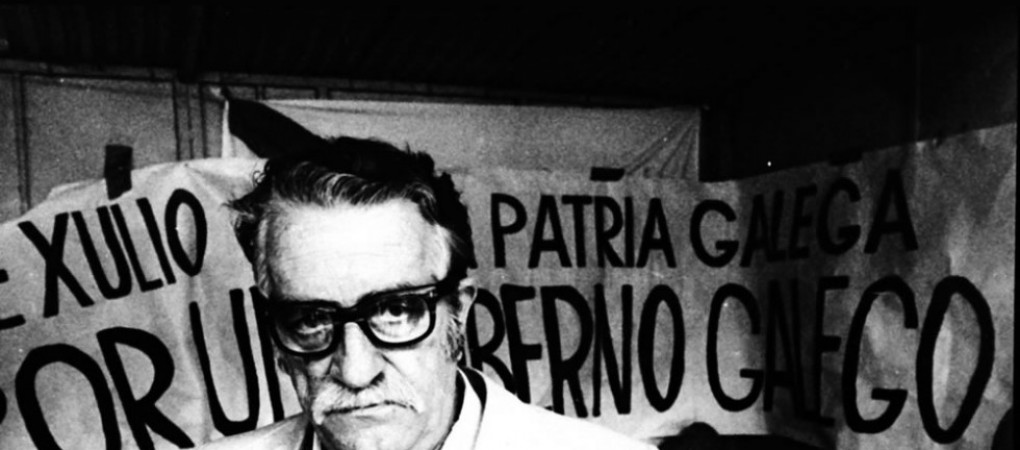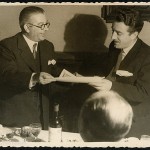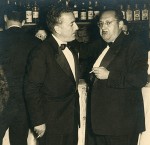1940-1950 Pontevedra
1912-1936 1936-1940 1940-1950 1950-1966 1966-1973 1973-1979
THE HARD YEARS IN PONTEVEDRA, THE FIRST POSTWAR PERIOD
Celso Emilio goes in for a public examination and gets the post of Secretary —and later Justice Chief— of the Pontevedra’s Tax Office (Fiscalía de Tasas de Pontevedra), where he worked between 1941 and 1950.
At this time, he writes poems, stories and articles and he gets strongly involved into the city’s cultural life. He joins social gatherings in cafes such as Carabela and Imperial.
In 1941 he publishes Al aire de tu vuelo, a singular book with loving poems written in spanish since 1938, deeply influenced by the poets of the spanish Generation of ‘27. In 1947 he publishes Bailadas, cantigas e donaires (Edicións Céltiga), a book of “neopopularistas” poems with a preface by Bouza Brey.
He collaborates with Sonata Gallega (1944-1952), a magazine directed by Ramón Peña. He appears as coordinator of the “Literary selections” since the magazine’s second number. He is also editor-in-chief at Finisterre (1943-1946), a magazine directed by Emilio Canda. He writes proses in the weekly Ciudad and in other publications like Mar, Guía Anuario de Pontevedra and Mensajes de Poesía de Vigo.
Between September 1948 and July 1949, he collaborates with the BBC Radio’s Galician Programme, which Francisco Fernandez del Riego was coordinating.
In 1949, Celso Emilio is called by Sabino Torres Ferrer to run the poetry collection Benito Soto, together with Emilio Álvarez Negreira and Manuel Cuña Novás. This is the first publishing company who would publish books of poems in the Galician language during the postwar period. One of these books is Musa alemá (1951), an anthology of fifteen poems by German poets such as Hölderlin, Dehmel, Rilke, Heine, Miegel and Werfel, translated by Antonio Blanco Freijeiro and adapted by Celso Emilio.
Related poems: Vintecinco anos de paz
España, sangue e area:
trinta millós de farrapos
atados a unha cadea.
Todos levan sobre a faz
un carimbo de tristura:
vintecinco anos de paz.
Paz de cuartel, paz de preso,
paz de pobo asoballado,
paz de pau e tente teso.
Paz do conde de Fenosa,
gran cabaleiro da industria
que asulaga a terra nosa.
Paz de osario e cimenterio,
paz de chaira inhabitada,
paz de oprobio e cautiverio.
Paz de mazmorra e censura,
paz de mansos periodistas
lambecús da dictadura.
Paz de roubo financiado,
paz de pulpo monopolio,
paz de fusil apuntado.
Paz de bispo troglodita,
solideo insolidario,
don Oppas hermafrodita.
España, sangue e area:
trinta millós de pantasmas
van pasando en estadea.









